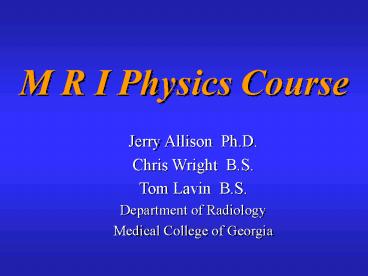M R I Physics Course - PowerPoint PPT Presentation
1 / 26
Title: M R I Physics Course
1
M R I Physics Course
Jerry Allison Ph.D. Chris Wright B.S. Tom Lavin
B.S. Department of Radiology Medical College of
Georgia
2
History of Magnetic Resonance Imaging
3
Nuclear Magnetic Resonance
- NMR was first described in 1946 by
- BLOCH, Hansen, and Packard at Stanford University
- and independently by
- PURCELL, Torrey, and Pound at Harvard University
4
BLOCH and PURCELL shared the Nobel Prize for
Physics in 1952
5
Lauterbur and Mansfield shared the Nobel Prize
in Physiology or Medicine in 2003
6
Paul Lauterbur (born 1929), Urbana, Illinois,
USA, discovered the possibility to create a
two-dimensional picture by introducing gradients
in the magnetic field. By analysis of the
characteristics of the emitted radio waves, he
could determine their origin. This made it
possible to build up two-dimensional pictures of
structures that could not be visualized with
other methods.
http//www.nobel.se/medicine/laureates/2003/press.
html
7
Peter Mansfield (born 1933), Nottingham, England,
Further developed the utilization of gradients
in the magnetic field. He showed how the
signals could be mathematically analyzed, which
made it possible to develop a useful imaging
technique. Mansfield also showed how extremely
fast imaging could be achievable. This became
technically possible within medicine a decade
later.
http//www.nobel.se/medicine/laureates/2003/press.
html
8
Lauterbur, while at SUNY at Stonybrook in 1973,
developed a technique that coupled the
resonant NMR field with a magnetic field gradient
to produce a two-dimensional image--ZEUGMATOGRAPHY
(join together magnetic fields to produce
a picture). This technique is now used for 2D
and 3D MRI.
9
Lauterbur and Damadian are given credit for the
birth of Magnetic Resonance Imaging in 1973
10
The medical doctor who claims to have
discovered the signals emitted by tissues which
led to the development of the MRI is blasting the
Nobel Committee for its refusal to recognize his
achievement. In an full page advertisement
published Monday in the New York Times, Dr.
Raymond Damadian said he was the creator of the
first MRI standing for magnetic resonance
imaging which he also notes is "emphatically an
MD's invention."
http//www.newsmax.com/archives/articles/2003/11/3
/205451.shtml
11
- Damadian said the Nobel committee has a highly
politicized selection process, one that also
favors Doctors of Philosophy and other scientists
over Doctors of Medicine. - Damadian said in his advertisement that in
1970 he first discovered that cancerous and
normal tissues offer different signals for
imaging purposes. Damadian said that on July 3,
1977, he conducted the first human scan using an
MRI.
12
"Although the two PhD's who have been named
for the prize one a chemist and the other a
physicist made later contributions to MRI
technology, as have many others since then, there
is no way, outside of outright deception, to
ascribe primary credit for the invention of the
MRI to two scientists who merely imagined
improved ways to display the image of the signals
I discovered," Damadian wrote in his ad.
13
"He said he developed the first medical uses
for MRIs, proposed the first body scanner,
discovered the tissue signals picked up by MRIs,
built the first MRI with his students, then "used
the scanner to obtain the first MRI picture of
patients with cancer." "By contrast," he
continued, the committee "has decided to honor
for 'discoveries concerning the invention of the
MRI' the PhD's Paul Lauterbur and Peter
Mansfield, along with literally thousands of
other research scientists had been working with
NMR machines for 25 years (1945-1970) without one
of them ever asking himself if NMR might have a
medical application." "I believe it is
outrageously unjust that the Nobel should decide
to exclude from its award the MD genesis of MRI,"
he added.
14
Damadian, while at Downstate Medical Center
(NY,NY), developed FONAR (field focusing nuclear
magnetic resonance). The FONAR technique could
acquire data from one voxel. The voxel location
could be manipulated to build up an image.
15
(No Transcript)
16
Damadian received a patent for Apparatus and
Method for Detecting Cancer in Tissue in 1974
17
Illustration included in Damadians
patent application in 1974.
18
Illustration included in Damadians
patent application in 1974.
19
The first image of a live animal was acquired
in 1976, and the first image of the human thorax
in 1977.
20
March, 1977. The first attempt to take a
human NMR scan. Dr. Raymond Damadian was the
first patient. Because of the uncertainty of
the outcome, he wore a cardiac monitor and a
blood pressure cuff.
21
July, 1977. The first successful human body
NMR scan with Dr. Lawrence Minkoff as the
volunteer.
22
The first human NMR scan
23
One of Damadians early scanners resides at the
Smithsonian.
24
The Indomitable, the NMR scanner used for the
worlds first human body NMR scan.
25
Damadian founded FONAR Corporation to market
MRI systems.
26
FONAR ? 3000 ca. 1982































